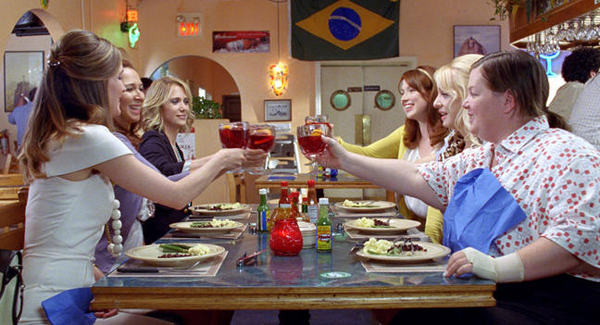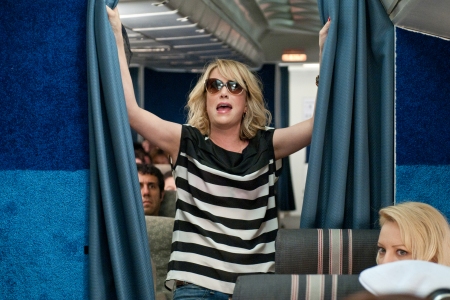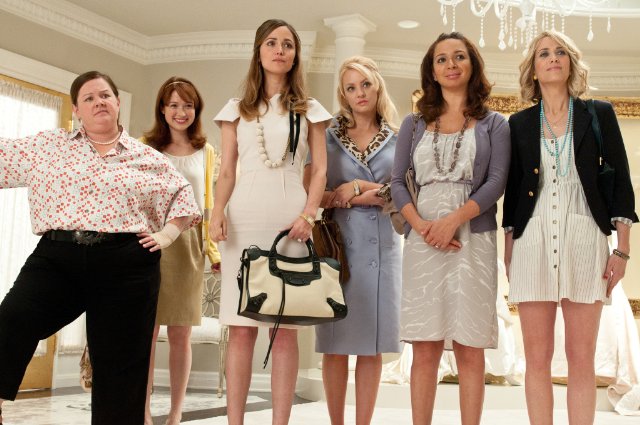Fri 13 May 2011
Love and Marriage
Posted by Ethan under Film Review, NYC Film Critic
Comments Off on Love and Marriage
Bridesmaids
Directed by Paul Feig
Written by Kristen Wiig and Anne Mumolo
Starring Kristen Wiig, Maya Rudolph, Rose Byrne, Melissa McCarthy
***1/2
There’s no way to say this without sounding hyperbolic, but the new Judd Apatow-produced, Paul Feig-directed comedy Bridesmaids is the closest I’ve seen a studio comedy come to channeling the Marx Brothers in some time. Now mind you, I don’t mean to place Bridesmaids in rarefied company of such classics as Duck Soup, A Night at the Opera or Animal Crackers. But what this movie has in common with those classics is the skillful way it escalates its comic set-pieces, upping the ante as the scene unfolds. Take the immortal stateroom sequence from A Night at the Opera, which opens in a perfectly ordinary way, with Groucho, Chico and Harpo crammed into a tiny cabin aboard a big ocean liner. Gradually, more and more people start entering the space (maids, janitors, manicurists) and attempt to go about their tasks despite the lack of room. The energy and choreographed chaos of the scene continues to build until it reaches its final punchline—Margaret Dumont opening the door—and the audience erupts in laughter.
Bridesmaids’ closest equivalent to Opera’s stateroom sequence occurs about halfway through on an airplane bound for Las Vegas. Aboard the flight is our heroine Annie (Saturday Night Live star Kristen Wiig, who also co-wrote the screenplay) a terminally single girl that has reluctantly agreed to serve as the maid of honor for her best friend Lillian’s impending nuptials. Lillian (Maya Rudolph), Annie and the other three members of the bridal party are on their way to Vegas for a big bachelorette blow-out, one that’s been organized by Helen (Rose Byrne), the bride’s other good friend and the one that desperately wanted the title of maid of honor. Always eager to one-up her competition, Helen got the group to deep-six Annie’s original suggestion of a low-key party at Lillian’s childhood summer home for a bacchanal in the City of Sin. She even arranged for first class tickets for the entire group—which also includes starry-eyed newlywed Becca (Ellie Kemper), oversexed housewife Rita (Wendi McLendon-Covey) and oddball Megan (Melissa McCarthy—knowing full well that Annie would only afford coach.
Anyway, the scene begins with Annie stuck in the back of the plane, while the other four women sip complimentary cocktails up front. Bored, she goes up to chat with Lillian—seated, of course, right next to Helen—for a bit only to be shooed away by a particularly zealous attendant. Meanwhile, Rita and Megan are comparing notes about married life and Megan is relentlessly trying to get her unassuming seatmate (Ben Falcone, McCarthy’s real-life husband) to admit that he’s an air marshal. Annie tries to visit Lillian a second time with the excuse that she’s feeling airsick. So Helen hands her a pill (and a cocktail to wash it down with) that naturally ends up knocking Annie for a loop. Tripping on whatever drug she’s taken, she proceeds to flagrantly disobey various airline rules. Her bad behavior escalates until she goes too far and all comic hell breaks loose.
What’s great about this sequence is the way it builds so naturally, driven by the characters’ behavior rather than the dictates of the plot. Moreover, each of the major players has a distinct bit of business to perform and all of them are treated to some kind of payoff. The structure of the scene, the way it layers joke on top of joke until it releases all that energy in one big burst of lunacy is very much in keeping with the Marx Brothers tradition, as well as classic screwball comedy in general. There are several other inspired moments as well, including a trip to a bridal store that’s ruined by an outbreak of food-poisoned inspired diarrhea (yes, this scene is rude and vulgar, but reader…I laughed) and a scene at Lillian’s bridal shower where Annie endures one humiliation too many and proceeds to smash the Parisian-inspired décor to smithereens.
The ensemble also plays off each other with Marxian skill; Wiig is unquestionably the Groucho of the piece, not only because she’s the lead but also due to her character’s quick wit and unapologetic self-absorption. Meanwhile, Annie’s verbal jousting with Lillian often recalls the patter between Groucho and Chico and McCarthy assumes Harpo’s role as the maladjusted clown. (This actress has the toughest role in the movie as her character deliberately straddles the line between eccentric oddball and offensive stereotype. To her credit through, McCarthy commits to the part wholeheartedly—there’s never any sense that she feels embarrassed or exploited by the material she’s asked to play.) Continuing down the line, Kemper and McLendon-Covey are The Zeppos—mostly due to the fact that the movie can’t quite figure out what to do with them rather than their lack of comic skill—and Byrne gamely takes on the thankless task of playing the stuck-up villain regularly flummoxed by Groucho. Finally, the Margaret Dumont role is inhabited by Irish actor Chris O’Dowd, who plays the unassuming traffic cop that falls for the screwed-up Annie. For whatever reason, the “romance†part has been the lamest thing about a lot of recent romantic comedies, but their love story is actually very sweet and funny, with Wiig and O’Dowd demonstrating a fine chemistry from their first scene together. (Mad Men star Jon Hamm also pops up in a very funny cameo as the Mr. Wrong in Annie’s life—he’s like a douchier Don Draper.)
As with most Apatow productions, Bridesmaids overlong in spots and occasionally rough around the edges. For example, an entire subplot involving Annie’s creepy British brother-and-sister roommates could and should have been left on the cutting room floor. And at times the character’s extreme self-pity threatens to cross the line from pathetically funny to just plain pathetic. But for much of its runtime, Bridesmaids moves with poise and confidence, making the hard business of earning honest laughs look easy.
Bridesmaids opens in theaters today.
Also in Theaters:
Hey Boo: Harper Lee and “To Kill a Mockingbirdâ€
Directed by Mary Murphy
***
If you’ve never read Harper Lee’s seminal 1960 novel To Kill a Mockingbird—and even if you have—you’ll likely come away from this slender documentary wanting to immediately pick up a copy and go through it cover to cover. That’s a testament to the simple beauty of the author’s words, which are read and analyzed here by a number of prominent talking heads, from noted academics to successful authors like Wally Lamb and Scott Turow to famous personalities like Tom Brokaw and the Earthbound deity known as Oprah. A book report in cinematic form, Hey Boo swiftly covers Mockingbird’s plot and major themes while also providing a brief recap of Lee’s own life story and the larger social impact of her novel. It also devotes a decent chunk of time to the equally popular film version, which starred Gregory Peck as crusading lawyer/devoted father Atticus Finch. The only big thing that’s missing is Harper Lee herself, which isn’t the movie’s fault since the 85-year-old writer has avoided the public eye for several decades now. The closest director Mary Murphy gets to Lee is her nonagenarian sister Alice, who confirms that she never completed another book after Mockingbird and that she had a rough falling out with childhood friend (and model for the character of Dill) Truman Capote when he grew envious of her success.  In the absence of fresh commentary from the novel’s source, Murphy leans heavily on excerpts from a vintage radio interview with Lee, as well as quotes gleaned from various magazine profiles around the time the book was published. The writer’s absence is keenly felt, but doesn’t torpedo the film since its overall emphasis is on the work she created rather than her life she led. While entirely pleasant viewing, it’s worth noting that Hey Boo isn’t particularly distinguished filmmaking; rather, it’s a meat-and-potatoes documentary that’s informative without being particularly substantial. It’s best to think of it as a gateway to or a reminder of the lasting power of one of the previous century’s most celebrated novels.
L’amour Fou
Directed by Pierre Thoretton
***
A companion piece of sorts to the 2008 documentary Valentino: The Last Emperor, which profiled the legendary Italian designer Valentino Garavani and his longtime lover/business associate Giancarlo Giammetti, L’amour Fou recounts the romance between haute couture icon Yves Saint Laurent and his own partner in fashion and love, Pierre Bergé. The big difference between the two movies is that Valentino and Giancarlo are both still with us and one of the pleasures of that film is the rare chance to observe their tense, but loving relationship. Laurent, on the other hand, died in 2008, leaving Bergé to deliver the last word about their four-decade long love story. And aside from a handful of comments from three of the designer’s other friends and collaborators, Bergé’s is the primary voice we hear throughout. Director Pierre Thoretton centers the film on a 2009 auction of Bergé and Laurent’s extensive art collection, housed in the pair’s beautifully appointed mansions located in various exotic locations around the world. “I’m not a nostalgic person,†Bergé remarks as he sits surrounded by artifacts of the life he shared with Laurent. The movie strives to match his attitude, casually observing teams of auction-house employees moving through the different houses wrapping up paintings, sculptures and other absurdly valuable tsotchkes. (Late in the movie, Bergé mentions that had he been the one to die first, Laurent never would have been able to divest himself of all these items.) Thoretton also tries to keep a clear eye when presenting his subjects’ personal history; there’s a noticeable wistfulness to the glimpses we catch of Laurent in his heyday, but Bergé is quick to remind us of his many demons, including drug addiction and depression. I’m not a student of fashion history as a rule and I can’t say that I came away from L’amour Fou understanding precisely why Laurent was such an important and influential figure in the industry. What captured and mostly held my interest was the film’s melancholic mood and its touching portrait of a man attempting to move beyond a great personal loss.
Everything Must Go
Written and Directed by Dan Rush
Starring Will Ferrell, Rebecca Hall, Christopher Jordan Wallace
**1/2
Every few years, Will Ferrell likes to take a break from the broad, ridiculous laffers that make up much of his oeuvre and headline a movie that’s in a decidedly more minor key. Everything Must Go is the latest in this off-brand Ferrell series, which also includes the 2005’s Winter Passing and 2006’s Stranger than Fiction. Adapted from a short story by Raymond Carver, the film begins as a compellingly dark comedy about a sad-sack management type (Ferrell) about to experience the worst day of his life. After being fired from his job, he returns home to discover his wife gone, their house locked and all his stuff piled on the front lawn. Bank account? Frozen. Credit cards? Same thing. Car? Repossessed. So with no money, no place to go and no way to get around, the guy decides to just plant his butt in the big easy chair on the lawn, drinking beers and being surly until he’s forced to clear out. Fortunately, his friend (and AA sponsor) is a cop and buys him a little extra time by encouraging him to turn his extended campout into a yard sale, which will give him five days to pull his life together before he’s legally obligated to vacate the premises. So Ferrell enlists the help of a shy, but smart neighborhood kid (Christopher Jordan Wallace, son of deceased rapper Chris “Biggie Smalls†Wallace) to get his stuff in some kind of saleable order. He also strikes up a casual friendship with the pregnant photographer (Rebecca Hall) that just moved in next door. These relationships help him become a better man, but turn the film into yet another soft, self-serious “road to recovery†tale in which an asshole learns how to stop being an asshole…at least temporarily. Ferrell’s performance is poised and focused throughout and he seems perfectly willing to continue down a darker road than writer/director Dan Rush clearly wants the movie to travel. After a strong first half, Everything Must Go ends up selling its leading man short, descending into easy sentimentality and tacking on a protracted upbeat ending. Believe it or not, Ferrell’s last studio vehicle The Other Guys took more creative risks than this indie production.




No Responses to “ Love and Marriage ”
Sorry, comments for this entry are closed at this time.